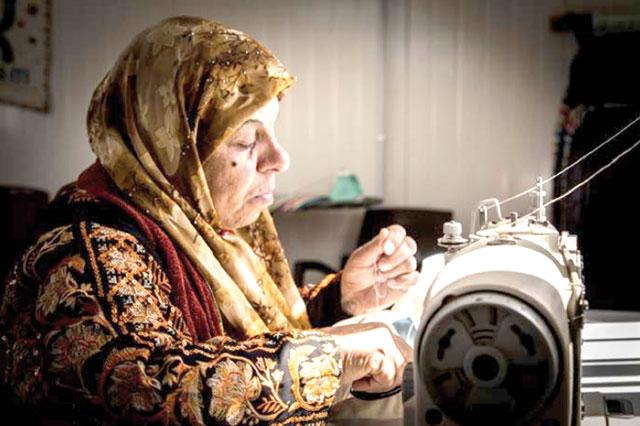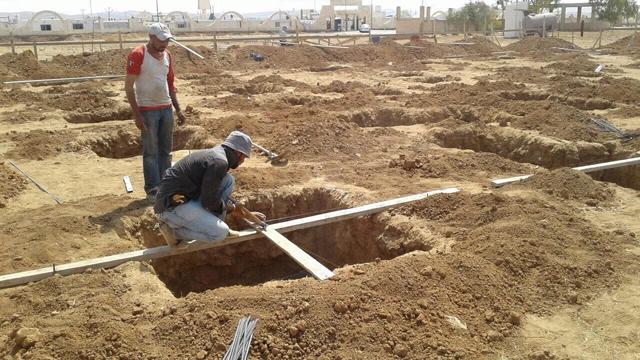You are here
Sewing factory rehabilitation revives lives of Mafraq women
By Camille Dupire - Oct 03,2018 - Last updated at Oct 03,2018

Some 120 women are currently employed at the local sewing factory in Balaama municipality (Photo courtesy of ACTED)
AMMAN — Some 120 Jordanian and Syrian refugee women living in Mafraq Governorate have been regaining a sense of self-worth since the rehabilitation of the local sewing factory, which gave them the opportunity to secure a livelihood and better integrate into their local community.
As part of its efforts to support displaced populations and host communities, the international NGO ACTED in 2016 launched the factory's rehabilitation project in Balaama municipality, with the support of the EU Trust Fund-MADAD.
For 27-year-old Ayah, who spent her entire life in Balaama, this was the key to escaping an endless vicious circle.
After passing the Tawjihi (General Secondary Education Certificate Examination), finding a job seemed "impossible" and she had never had the opportunity to earn an income.
"I had no income to continue my studies after Tawjihi because of the lack of job openings close to home and I used to think that going to college was just a dream," she remembered.
But, with the rehabilitation of the local factory, Ayah said she was "allowed to dream again" and, now that she is financially independent, she plans to use her income to enroll in college soon.
“Since the start of the Syrian crisis in 2011, Jordan has seen its population increase by over 1 million. This has increased social tensions between Jordanians and Syrians living in host communities, especially around key sectors such as employment opportunities and municipal service delivery,” ACTED said in a statement, noting that the Balaama rehabilitation project aimed to “contribute to the economic self-reliance, resilience and social stability of populations in the refugee-affected municipality".
In June 2016, the NGO began facilitating round table dialogues with community members from all age ranges, aiming to help them draft community improvement plans for their municipality through a list of project ideas to boost the local economy.
And the Mafraq residents made their choice: Rehabilitating the Balaama sewing factory would be "the key" to improve the community members' lives.
In addition to rehabilitating the sewing factory building for training and production, ACTED also facilitated a partnership between the municipality and the private sector to manage the factory, which counts multiple production lines and is focusing on the fabrication of high quality cotton undergarments.
The construction process allowed for the creation of temporary employment for workers at the site, before providing 120 women with stable employment, including a minimum of 10 per cent of vacancies for Syrian women, according to ACTED.
Inas, 27, who holds a Bachelor Degree in educational sciences, already had a few work opportunities in the past, but her job at the factory was the first time she got temporary employment.
"The work environment in the factory and the conditions are the main reason me and my family accepted this job: The factory is located close to my home and I don’t need transportation to go to work," she told ACTED, noting that this allows her to check up on her children and have lunch with them during breaks.
Inas is now able to pay for her master’s degree in education and contribute to housing expenses, which drastically changed hers and her family's life.
Her experience was also echoed by 26-year-old Rania, who said she "always had high aspirations, but never the means to accomplish them".
Despite having a bachelor degree and temporary work experience, she said she was still struggling to find a job where the work environment and closeness to home suited her. With the sewing factory, she now found the chance to receive a sustainable income that helps her support in house expenses and pay off some loans.
In addition to the Balaama sewing factory project, ACTED and the EU Trust Fund-MADAD also contributed to the construction of a multipurpose hall in Rusafyah in the Zarqa Governorate.
Related Articles
AMMAN — With some 5,000 cash-for-work positions available for nearly 80,000 Syrian refugees living in Zataari camp, the competition for work
AMMAN — A series of workshops held in Ramtha on the type of humanitarian response needed to address the needs of vulnerable Jordanian and re
AMMAN — Nisreen Ramadan, 37, a mother of five from the Jordan Valley’s Deir Alla region, was adamant on continuing her education to secure a

















